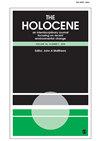Volcanic, tectonic and climate controls on lacustrine sedimentary supplies over the last millenia in NE Chilean Patagonia (Lake Esponja, Aysen, 45°S)
IF 1.8
3区 地球科学
Q3 GEOGRAPHY, PHYSICAL
引用次数: 0
Abstract
The environmental variability of Northern Chilean Patagonia during the last millennia is evaluated using a multi-proxy analysis of sediment cores from Lake Esponja (45°S 72°W) to decipher if the sediment deposition is controlled by volcanic eruptions, landslides induced by earthquake or heavy rainfall. The lake is located in a glacio-tectonic valley in Patagonia. The organic-rich clayey silt sediment with low biogenic silica content was analysed for grain size, magnetic susceptibility, organic matter, biogenic silica content and diatom assemblages, mineralogy (X-ray diffraction), organic (IRMS C and N analyses) and inorganic (XRF core-scanner) geochemistry and glass shard major composition (Microprobe, SEM). The combination of 210Pb, 137Cs, 14C and tephrochronology indicates an averaged accumulation rate of 0.4 mm/year, leading to a record of ~3.5 kyr within 154 cm. The sedimentary geochemistry records changes in volcanic supplies, diatom productivity and detrital inputs. The sediments were interrupted by millimetric to centimetric layers corresponding to tephra deposition related to explosive eruptions of nearby volcanoes Macá, Melimoyu and Hudson. Concerning the diatoms, the dominant planktonic species (80–150 cm) are replaced by benthic species in a transition interval (55–80 cm) and then by Surirella spp. in the upper core. This last genus indicates a closure of the basin ~2 ka ago, probably related to an uplift linked to a rejuvenation of the Mañihuales fault. This local change could reflect regional tectonic instability. Indeed, a partial earthquake rupture occurred around ~AD100 along the southern part of the Valdivia segment, recorded as a mass transport deposit in Aysén fjord sedimentation. The fine detrital input varies over time with more variable Si/Al values in the lower part of the LEs14 core than in the upper 80 cm. The higher values may reflect wetter conditions, leading to an higher lake level and more turbid conditions in agreement with changes in diatom assemblages.智利东北部巴塔哥尼亚(艾森,45°S, Esponja湖)近千年来火山、构造和气候对湖泊沉积供应的控制
利用对Esponja湖(45°S 72°W)沉积物岩心的多代理分析来评估智利北部巴塔哥尼亚在过去一千年中的环境变化,以确定沉积物沉积是否受到火山爆发、地震或强降雨引起的滑坡的控制。该湖位于巴塔哥尼亚的冰川构造谷中。对低生物源二氧化硅含量的富有机质粘土淤泥质沉积物进行了粒度、磁化率、有机质、生物源二氧化硅含量和硅藻组合、矿物学(x射线衍射)、有机(IRMS C和N分析)和无机(XRF岩心扫描)地球化学和玻璃碎片主要成分(Microprobe, SEM)分析。210Pb、137Cs、14C和年代学表明,平均积累速率为0.4 mm/年,在154 cm范围内积累了~3.5 kyr的记录。沉积地球化学记录了火山供给、硅藻生产力和碎屑输入的变化。沉积物被毫米至厘米层所打断,这些层与附近的mac火山、Melimoyu火山和Hudson火山的爆发有关。硅藻的优势浮游物种(80-150 cm)在过渡区间(55-80 cm)被底栖生物取代,然后在上部岩心被Surirella spp.取代。这最后一个属表明约2 ka前盆地闭合,可能与Mañihuales断裂恢复有关的隆升有关。这种局部变化可能反映了区域构造的不稳定性。事实上,大约公元100年左右,沿Valdivia段南部发生了一次局部地震破裂,记录为ays峡湾沉积中的块体搬运沉积。细粒碎屑输入随时间变化,LEs14岩心下部的Si/Al值比上部80cm的变化更大。较高的值可能反映了较湿润的条件,从而导致较高的湖泊水位和较浊的条件,这与硅藻组合的变化一致。
本文章由计算机程序翻译,如有差异,请以英文原文为准。
求助全文
约1分钟内获得全文
求助全文
来源期刊

Holocene
地学-地球科学综合
CiteScore
4.70
自引率
8.30%
发文量
106
审稿时长
4 months
期刊介绍:
The Holocene is a high impact, peer-reviewed journal dedicated to fundamental scientific research at the interface between the long Quaternary record and the natural and human-induced environmental processes operating at the Earth''s surface today. The Holocene emphasizes environmental change over the last ca 11 700 years.
 求助内容:
求助内容: 应助结果提醒方式:
应助结果提醒方式:


